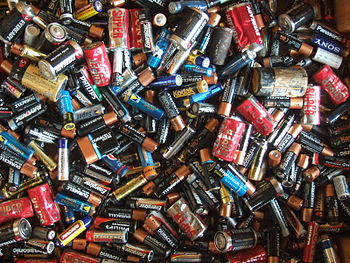Here are five tips to help improve your recycling this holiday season, and reduce your environmental impact - which is a great gift to the planet!
Tip #1: Recycle Your Batteries
 |
| Batteries. (Photo credit: Wikipedia) |
How do you recycle your batteries? Simple. Collect them and take them to RadioShack or Home Depot. That's right - They'll recycle your batteries for you, for free.
Tip #2: Recycle Your Catalogs
Holiday season is also catalog season. Chances are you're going to get a whole slew of catalogs in the mail, even if you never asked for them.
Don't throw them away. Instead, collect all of them and recycle them. Do this for all the papers, mailers and various scraps that'll come your way in the holiday season. This includes greeting cards that you don't plan on keeping.
Tip #3: Shipping Materials
If you're shipping presents to other people, pack your boxes with newspaper. It works just as well as Styrofoam, but is easier on the environment. Not only is Styrofoam made of toxic chemicals that clog up landfills, the process to make them is toxic as well.
If you're receiving gifts in the mail, make sure you recycle all the shipping materials. Recycle your cardboard boxes and any packaging you can.
 |
| (Photo credit: Wikipedia) |
Not all gift wrap is recyclable. When you're shopping for wrapping, look for the recyclable symbol. The more people who buy recyclable gift wraps, the more likely stores are to stock them in the future.
Don't be shy about telling people you give gifts to that the gift wrap can be recycled. A lot of people just won't know.
Tip #5: Reuse, Reuse, Reuse
Reusing something is far better than recycling something. When you recycle something, be it plastic or paper, only a fraction of what you throw out can actually be reused. Recycling is also an energy intensive process. When you reuse something, you skip all of that.
Reuse your boxes. Re-gift presents that you don't like. Store your artificial Christmas tree for next year instead of throwing it out. Look for creative ways to reuse things instead of just tossing it in the trash or recycle bin.
These five tips will help you stay eco-friendly this holiday season. Get in the habit of asking yourself: "Can I recycle or reuse this?"




